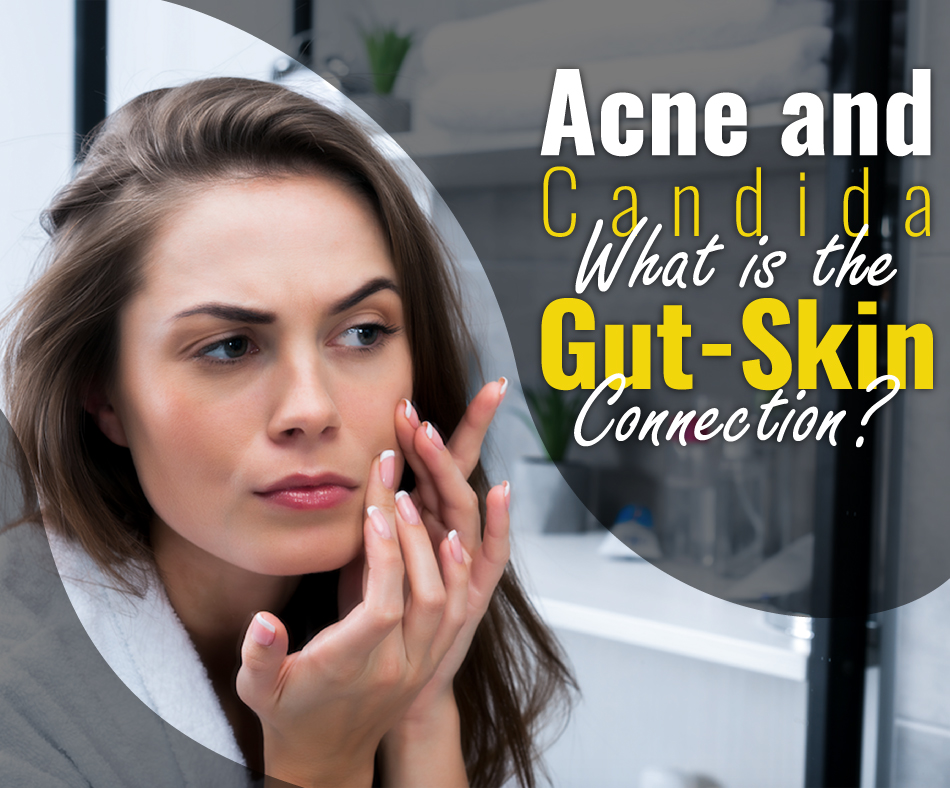What is Skin Microbiome?
There are over a thousand species of bacteria that live on your skin. Some of these bacteria are highly beneficial, as they protect your skin with no bad effects. They help keep the skin elastic, and well-hydrated. They also help reduce pimples, acne, and spots and maintain the overall health of your skin.
Their functioning is similar to that of the healthy bacteria that reside in your gut and help with digestion.
Eric Bakker talks about all this and more in detail in his e-book available on Amazon.
What is the Gut-Skin Axis?
In an effort to effectively treat acne, researchers found a clear connection between stomach problems and skin issues. Acne trouble begins when there’s an imbalance of gut microbiome; particularly Candida overgrowth.
That’s because Candida overgrowth leads to gut permeability. The condition is also called the ‘leaky gut’. A leaky gut is a condition when the toxins from the gut break free and travel into the bloodstream leading to local and systemic inflammation. It starts causing all kinds of issues, including skin problems.
Naturally, it would appear that taking care of gut microbes with probiotics, fruits, vegetables, and a candida diet can be a long-term strategy in balancing blood sugar levels, reducing oxidative stress, and fighting inflammation, as all of these things may lead to acne.
Symptoms of Candida-Related Acne
If you develop acne and zits at the same time when you start having digestive issues - this could be a potential red flag of underlying fungal acne. In the same way, if you feel difficulty urinating or think that you might have a UTI at the same time, this may be another sign.
Other symptoms of Candida-related acne include feeling achy and tired all the time. Some people experience allergies and sinus issues at the same time as they break out. Naturally, you should look out for any skin irritation. Also, observe any changes in the nail colors.
If you suffer from compromised immune or auto-immune conditions, you may have a higher chance of developing Candida-related acne. At other times, it’s your genetic makeup that could make you prone.
Let's take a look at how antibiotics, lifestyle, and diet can worsen the symptoms of acne.
Antibiotics & Acne
Most of the time doctors would prescribe antibiotics like Tetracycline to those major acne issues. In the short term, they might fix the issue but in the long run, they prove to be more harmful than good.
That’s because antibiotics are well-known to disrupt the gut flora. They wipe out some of the major healthy populations of bacteria which keep things balanced in our stomach and also help with digestion. Once again, the antibiotics may treat the bacterial infection causing acne but they will wreak havoc on the immune system of the body. In the long run, it will worsen the issue.
Connection Between Stress & Candida
There’s a close connection between breakouts and overwhelming stress. Just like any other form of breakouts, candida acne is also caused by excessive amounts of stress. It’s not the psychology of stress alone that triggers the breakout.
Rather, it’s how the body responds to stress which sets into motion a series of chemical changes that leads to acne and zits.
When your body experiences stress, it releases androgen in high amounts. That’s a major cause of acne. This whole-body inflammation leads to an excessive production of natural oil which clogs the pores on your skin.
Let’s just say that the mental imbalance causes physical imbalances which eventually manifests in the form of bodily reactions and discomforts.
How to Improve the Health of your Skin & Gut?
Treating Candida and gut health requires more of a lifestyle makeover. With that said, a few changes can go a long way in fixing things.
Consume a Quality Probiotic
Probiotics are loaded with live bacteria strains that keep your digestion healthy. They also heal the ‘leaky gut’ by promoting the healing of intestinal lining and gut cells. Studies tell us that probiotics are one of the most effective ways to restore stomach health and treat acne.
Cut Back on the Sugar
Sugar is the #1 cause of all kinds of inflammations, skin issues caused by Candida overgrowth, as well as myriad other health issues. So, you need to cut back on starches and refined sugars.
Use Natural Alternatives to Antibiotics
Instead of using antibiotics, try to go for more natural antimicrobial solutions. For example, caprylic acid, oregano oil, and garlic; all fight the bad bacteria population. They are highly effective and nowhere as harmful as antibiotics.
Drink Water
Hydration is key when you talk about fluxing toxic and clearing skin problems. Water is the best way to detoxify the pathways and keep your skin fresh and clean. It also keeps the gut healthy.
Use a Candida Cleanse
You can look up a good candida cleanse online. A good cleanse gives your body a clean slate to start over. After that incorporate a healthy, fiber-rich, nutritious diet to keep your system, gun, and skin nourished and well-functioning.
In Conclusion
When you understand your gut and skin better, you can naturally take better care of skin problems. It all begins with self-education and awareness.
You may also like
9 Powerful Self-Motivation Techniques You Need to Know
Necessary Tips To Keep Your Teeth Healthy
Lifestyle Changes To Empower Yourself

